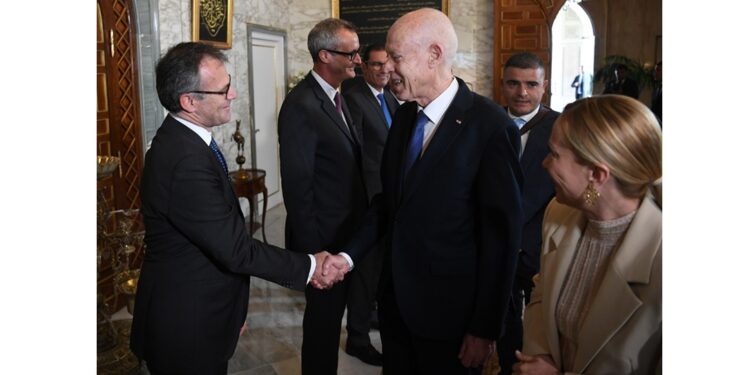Under the guise of energy and agricultural cooperation, the express visit of Giorgia Meloni in Tunis confirms one thing: Tunisia has become a major strategic issue for Italy, at the crossroads of its migratory, security and economic concerns.
Behind the two projects put forward – Elmedfuture underwater power lineAnd Tannwastewater reuse program for agricultural purposes – an Italian attempt at the southern neighbor is emerging from the southern stabilizationvia the development lever.
Technical cooperation with high political value
On paper, ELMED and Tanit projects are a classic cooperation: energy infrastructure, agricultural adaptation, transfer of know-how. But their entry forward by the two heads of state – Giorgia Meloni and Kaïs Saïed – underlines a more strategic sequence : strengthen the internal capacities of Tunisia to stem instability and departures.
- Elmed is an underwater electrical interconnection project between Kélibia (Tunisia) and Partanna (Sicily), 220 km long, with a capacity of 600 MW. Co -financed up to 307 million euros by the European Unionit aims to link European and North African energy markets, while promoting the integration of Tunisian renewable energies.
- Tannfor its part, aims to irrigate 11,500 hectares of state land Using the treated wastewater of five purification stations (El Attar, Melyan, Sfax, Enfidha, Agareb). Officially launched in January 2025, it benefited from funding of approximately 2 million dinars And is part of a wider goal: to improve Tunisian agricultural resilience in the face of drought.
The spectrum of irregular migration
In watermark, it’s good The migratory question which obsesses Rome. Since coming to power, Giorgia Meloni has done Reduction of migratory flows in the Mediterranean A pillar of its external action. Tunisia, both country of departure and transitcrystallizes this concern.
The Mattei plan – doctrine of African policy developed by Italy – hears Conditioning development aid to migratory cooperation. Clearly: help, but on condition that the borders are held. Tunisia, economically weakened, has been offered sectoral support in exchange for strengthening the coast control. The recent support for the Elmed project – which has nothing to do with apparently migration – is also part of this logic of implicit counterparties.
An asymmetrical but essential partnership
This strengthening of cooperation does not mask asymmetry of interests. For Italy, Tunisia is a lock. For Tunisia, Italy is an access channel – to Europe, to funding, to stability. If projects like Elmed and Tanit draw a co-development perspective, they are nonetheless managed by European priorities: Secure supplies, brake mobility, export the energy transition.
Tunisia is trying to take advantage of this renewed interest, without renouncing increasingly assertive political sovereignty. According to the Tunisian presidency, Kaïs Saïed notably insisted on the need to organize voluntary returns of migrants in an irregular situation, denouncing the growing weight supported by its country and refusing that Tunisia will become a “Corridor or a place of installation”. He also pointed out the inaction of an international system “unfair”including migrants – like Tunisia – would be the victims.
A position that reaffirms the refusal to see cooperation reduced to a simple migration management tool, to the detriment of Tunisian national priorities.








